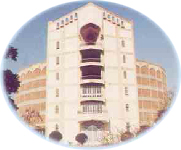Foreign/NRI/Sponsored Candidates
Faculty
of Islamic Studies and Social Sciences This
is the only faculty that offers courses in Humanities. The faculty consists of the following
department and centres, which
are mainly research oriented. This
is the only faculty that offers courses in Humanities. The faculty consists of the following
department and centres, which
are mainly research oriented.
Teaching Research courses leading to the award of Ph.D degree are offered in the Department of Islamic Studies and the Centre for Federal Studies. Only the Department of Islamic studies offers Master Programme in
Islamic Studies. Research Department of Islamic Studies: Thrust
Areas
Publications Main thrust of research in the Department is in the areas which have relevance to the problem faced by the contemporary Muslim world with special reference to the Indian Muslims; Causes of decline of Muslims in and outside India; Issues related to misunderstanding about Islam and Muslims; the impact of Islam on India and vice-versa; Contribution of Muslim Indian scholars, noblemen and Sufi during the medieval and Sultanate period; Development and appraisal of Madrasa Education, Tasawwuf and its impact. Translations of the outstanding works by Muslims scholars. Qanoon-fil-Tib, has also been taken up. The following projects have been successfully completed:
Beside these, an UGC supported project on the “Shumali Hind mein Silsile-e-Qadriya: Aghaz we Irtiqa” is under progress. Another very important achievement of this faculty has been the editing and translation of Al-Qanun filtib - a classical work of physician and scholars Ibne Sina (Avicena) which is an Arabic text available in four volumes. One volume has been edited and printed. The second volume is in press. Work on third volume is presently going on. Several new research topics have been assigned to the faculty members of the department. “The contribution of Ulemas in the Freedom Struggle with Special Reference to UP”. “Hazrat Shah Naeem Ata: Life and Works”. “Educational Problem of Indian Muslims and their solutions in the light of Islamic teaching”. “Western Perceptions of Islamic Fundamentalism - A Comparative Study of John Esposito, Fred Holiday and Samuel Huntington”. “Status of Women in its philosophical Perspective with Special Reference to Islam and Hinduism”, “Study on Madarsa Education”. At present, four Ph.D students are enrolled for research. Publications
Centre for Federal Studies: Thrust
Areas
Publications The Centre for Federal Studies (CFS) is a centre of advanced study, documentation and research on the many problems and aspects of federal polity and plural society in India, that would reach out later to the South Asian region, and to other parts of the world. It is the only Centre of its kind in India, which is exclusively and comprehensively focused on the study and research of the several dimensions of federalism; and is affiliated to the International Association of Centres for Federal Studies (IACFS), which includes members from Europe, America, Australia and Africa. The CFS was initially set-up in November 1990, as a research project on few specific themes of Indian polity and politics, with the support provided by the Hamdard National Foundation, through the Hamdard Education Society, on the initiative of its President, Hakeem Abdul Hameed Saheb. During this initial period -- November 1990 to July 1994 -- it was known as the Indian Institute of Federal Studies (IIFS), under the Directorship of the renowned social scientist, (the late) Prof. Rasheeduddin Khan. In order to give it a stable and durable institutional base, and keeping in mind its national importance and international academic relevance, it was decided to make it a part of the University system. On the recommendation of the UGC Visiting Committee the UGC it was re-designated as Centre for Federal Studies (CFS) in August 1994, and was formally incorporated in the Jamia Hamdard, (Hamdard University), New Delhi. The Centre is pursuing the following objects from its beginning:
Thrust Areas for the study of Federalism in India Recasting
Centre-State relations : Constitutional, Political, Financial and
Administrative aspects -- an exercise in building a balanced and
cooperative federal system in India. Working of India's Political system and party system at the three levels -- Centre/all India, State/region and local bodies/Panchayats and Nagarpalikas : areas of convergence and areas of discord.
Publications
Centre for History of Medicine and Science: Thrust
Areas
Publications The Centre (erstwhile department) for History of Medicine and Science was established in 1983, and it remained a part of the Faculty of Science upto 1993. The same year, it was transferred to the Faculty of Medicine. Now, it is associated with the Faculty of Islamic Studies and Social Sciences. Since its inception, the Centre is conducting
research in the history of Unani medicine. Research work embarked
in the Centre is related to the development of Unani medicine during the
Pre-Mughal, Mughal and Post-Mughal periods in India, and these are the
thrust areas of research.
The Department of History of Medicine and Science is basically a research
department for History of
Medicine and Science. The
work on a project “Critical Edition of Khayral-Tajarib” is continued.
The department has published proceedings of the seminar held in
1995.
|
|
